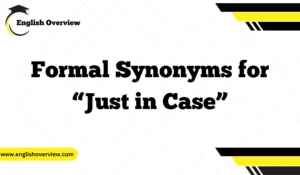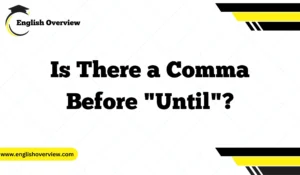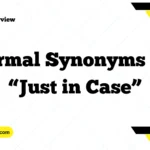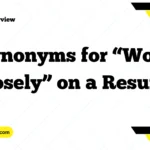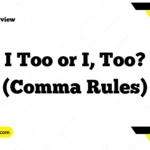Understanding when to use a comma after “yesterday” can enhance the clarity and readability of your sentences. This guide will explore the rules for incorporating commas after “yesterday,” supported by examples to illustrate correct and incorrect usage.
When to Use Commas with “Yesterday”
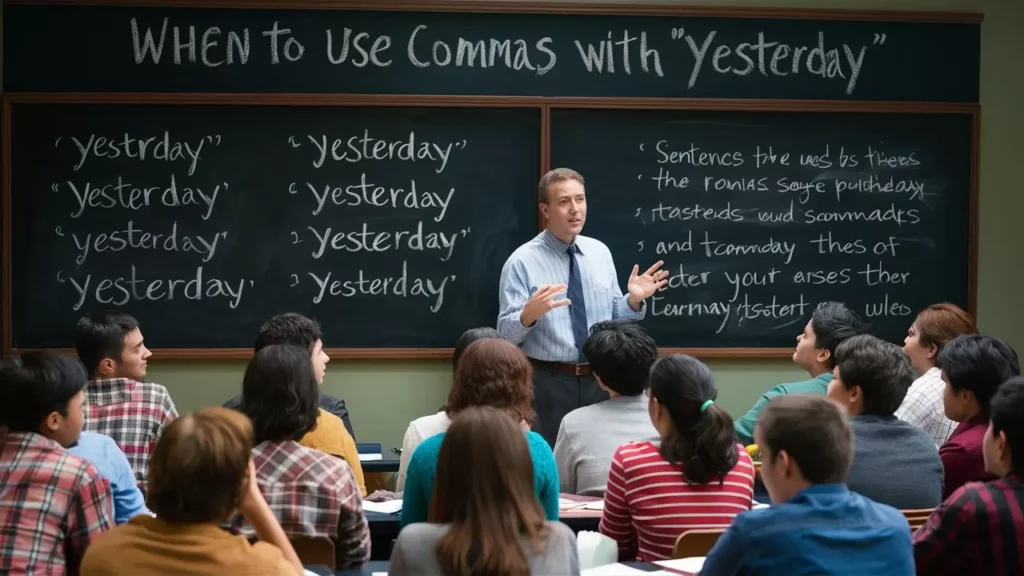
Rule 1: Starting a Sentence
Correct Usage:
- Yesterday, I went to the market.
- Yesterday, the weather was delightful.
Incorrect Usage:
- Yesterday I went to the market.
- Yesterday the weather was delightful.
Explanation: When “yesterday” starts a sentence, it’s often followed by a comma to separate it from the rest of the sentence. This helps in indicating a pause and setting the temporal context right at the beginning.
Rule 2: In the Middle of a Sentence

Correct Usage:
- I met him yesterday, and we had a long talk.
- They completed the project yesterday, which was ahead of the deadline.
Incorrect Usage:
- I met him yesterday and we had a long talk.
- They completed the project yesterday which was ahead of the deadline.
Explanation: If “yesterday” is used in the middle of a sentence, especially before a coordinating conjunction that connects two independent clauses, a comma may follow “yesterday.”
Rule 3: “Yesterday” Without a Following Comma for Direct Connection
Correct Usage:
- The homework assigned yesterday requires thorough research.
- My friends visited me yesterday evening.
Incorrect Usage:
- The homework assigned yesterday, requires thorough research.
- My friends visited me yesterday, evening.
Explanation: When “yesterday” directly modifies a noun or is part of a phrase (like “yesterday evening”), no comma is needed after “yesterday.”
Rule 4: After “Yesterday” at the End of a Sentence

Correct Usage:
- The agreement was finalized, yesterday.
- The announcement came out, yesterday.
Incorrect Usage:
- The agreement was finalized yesterday.
- The announcement came out yesterday.
Explanation: Typically, you do not use a comma after “yesterday” when it ends a sentence. The incorrect examples here show a common mistake; commas are generally not necessary in such positions.
Read More: Do You Put a Comma After “Yesterday”?
Rule 5: “Yesterday” in a Compound Sentence
Correct Usage:
- I visited the museum, and yesterday, I went to the botanical gardens.
- They had a meeting in the morning, and yesterday, they worked from home.
Incorrect Usage:
- I visited the museum and, yesterday I went to the botanical gardens.
- They had a meeting in the morning and, yesterday they worked from home.
Explanation: When “yesterday” is inserted into a compound sentence to specify the timing of one of the actions, it should be set off with commas, especially if it interrupts the sentence flow.
Rule 6: Omitting Comma for Immediate Time Description
Correct Usage:
- The package arrived yesterday morning.
- She left for her trip yesterday afternoon.
Incorrect Usage:
- The package arrived yesterday, morning.
- She left for her trip yesterday, afternoon.
Explanation: When “yesterday” is immediately followed by a time of day, no comma is needed as “yesterday” directly modifies the time expression.
Rule 7: “Yesterday” with Direct Speech
Correct Usage:
- “Yesterday,” he said, “was quite an adventure.”
- “I finished the book yesterday,” she announced.
Incorrect Usage:
- “Yesterday,” he said “was quite an adventure.”
- “I finished the book yesterday,” she announced.
Explanation: When “yesterday” is part of direct speech, it should follow the conventional rules of commas in direct speech, such as being followed by a comma when introducing a quote or being inside the quotation marks if it’s part of the statement.
Rule 8: Emphasizing “Yesterday” for Reflection
Correct Usage:
- Reflecting on yesterday, I realized how much I’ve grown.
- Considering what happened yesterday, I think we should be more cautious.
Incorrect Usage:
- Reflecting on yesterday I realized how much I’ve grown.
- Considering what happened yesterday I think we should be more cautious.
Explanation: When “yesterday” is used at the beginning of a reflective phrase or clause, a comma helps to set off the introductory element from the main clause, enhancing readability.
Rule 9: “Yesterday” in Complex Sentences
Correct Usage:
- When I saw her yesterday, she seemed upset.
- She said she would call me back yesterday, but she didn’t.
Incorrect Usage:
- When I saw her yesterday she seemed upset.
- She said she would call me back yesterday but she didn’t.
Explanation: In complex sentences, “yesterday” may be part of a dependent clause or followed by a coordinating conjunction and an independent clause. Commas help to clarify the sentence structure and relationships between clauses.
Rule 10: “Yesterday” for Dramatic Pause
Correct Usage:
- I realized, yesterday, just how important this is.
- You mentioned, yesterday, that you would be leaving.
Incorrect Usage:
- I realized yesterday just how important this is.
- You mentioned yesterday that you would be leaving.
Explanation: Sometimes, “yesterday” is used with commas to create a dramatic pause or to emphasize the timing of an action. This stylistic choice can enhance the narrative quality of a sentence.

James Wilson is currently an English instructor at a university. She has experience in teaching and assessing English tests including TOEFL, IELTS, BULATS, FCE, CAE, and PTEG. With over a decade of teaching expertise, James Wilson utilizes his knowledge to develop English lessons for her audience on English Overview.




